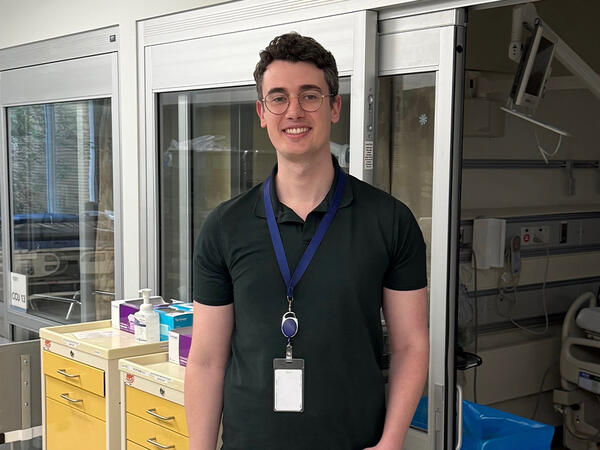Photo: Getty Images
As one of the executive editors for the British Journal of Clinical Pharmacology, Alice Tseng, associate professor (status) at U of T’s Leslie Dan Faculty of Pharmacy, felt the time was right to highlight pharmacology research related to trans and gender-diverse people.
They often face barriers to accessing health care, including stigma and lack of trans-competent care. In addition, some countries are enacting legislation that is making it more difficult for trans people, especially youth, to access gender-affirming care. Against this landscape, there is a clear need to improve care for this underserved population.
“Trans and gender diverse people are underserved and underrepresented, despite facing complex medical, pharmacological, psychosocial and societal challenges, and we need more thoughtful and appropriate research.”
“Trans and gender diverse people are underserved and underrepresented, despite facing complex medical, pharmacological, psychosocial and societal challenges, and we need more thoughtful and appropriate research,” says Tseng, a pharmacotherapy specialist at Toronto General Hospital.
Tseng, Mona Loutfy from Women’s College Hospital, and Kimberley Scarsi from the University of Nebraska Medical Centre co-edited a special issue of the British Journal of Clinical Pharmacology focused on “putting people first.” The issue features articles from experts in Canada, the U.S., and U.K. focused on topics including barriers to participation in clinical trials, drug interactions with gender-affirming hormone therapy, and the importance of community partnerships in research.
“At the end of the day, our role as pharmacists is to look after a person in front of us,” says Tseng. “We are taught about patient-focused care and patient-centred decisions, and providing high-quality and appropriate care for trans and gender-diverse people is one example of putting people first.”
Journal issue highlights importance of community engagement
Several articles in the issue are related to engaging trans and gender-diverse people in clinical trials. They are often excluded from participating in trials, resulting in gaps in knowledge of whether new medications for a range of conditions, including chronic diseases such as dementia and hypertension, are effective for this population.
“We often see official guidelines that say that a medication can’t be recommended in this population because of a lack of data, so they are being left behind,” says Tseng. “We absolutely need appropriate representation in trials so that we know that new treatments and interventions will be effective for everybody.”
A key concern among trans people and their health care providers is the potential for interactions between gender-affirming hormone therapy and antiretrovirals for treatment or prevention of HIV. Lack of knowledge around this topic can lead to under-prescribing for one or both of these life-saving medications.
Tessa Senneker, a Doctor of Pharmacy (PharmD) graduate from the Leslie Dan Faculty of Pharmacy and currently working at Kingston Health Sciences Centre, published a review of the evidence of interactions between gender-affirming hormone therapy and antiretrovirals for HIV treatment and prevention. Senneker reviewed the published literature exploring potential interactions and concluded that the two treatments can be co-administered safely.
“Pharmacists are in a key position to advocate and reassure both trans people and other health care providers about the safe use of these life saving therapies.”
“Pharmacists are in a key position to advocate and reassure both trans people and other health care providers about the safe use of these life saving therapies,” says Senneker, who also completed a research rotation and hospital residency with Tseng. “I hope this article can be used as a succinct reference for health care providers to promote nuanced discussions with trans people around the risks and benefits of using hormone therapies with antiretrovirals and will facilitate shared decision-making between trans people and their health care teams.”
Tseng says she hopes that the journal’s special issue will stimulate further research that engages with trans and gender-diverse communities and help pharmacists provide better care.
“The issue includes some fantastic papers about community engagement and modifying structural barriers to allow for more meaningful inclusion at all levels of research and knowledge translation,” says Tseng. “We hope that having this issue is a critical mass that attracts even more submissions, stimulates further research, and creates even more momentum.”
More News
Image

Welcoming Ivy Lam as Academic Lead in Climate, Health & Sustainable Care
Assistant Professor Lam will guide the Leslie Dan Faculty of Pharmacy's efforts to embed environmental sustainability across the Faculty.
Read More
Image

Pharmacy alum’s research shows how full-scope practice improves cancer care
Honoured with a national award, Adrian de Boer says his residency experience was a powerful reminder that he's making a meaningful change to the pharmacy profession.
Read More
Image

Pharmacy alum passionate about helping community pharmacists practice to full scope
As a pharmacy leader at Rexall, Heidi Wittke uses frontline experience to lead initiatives that improve patient care
Read More

